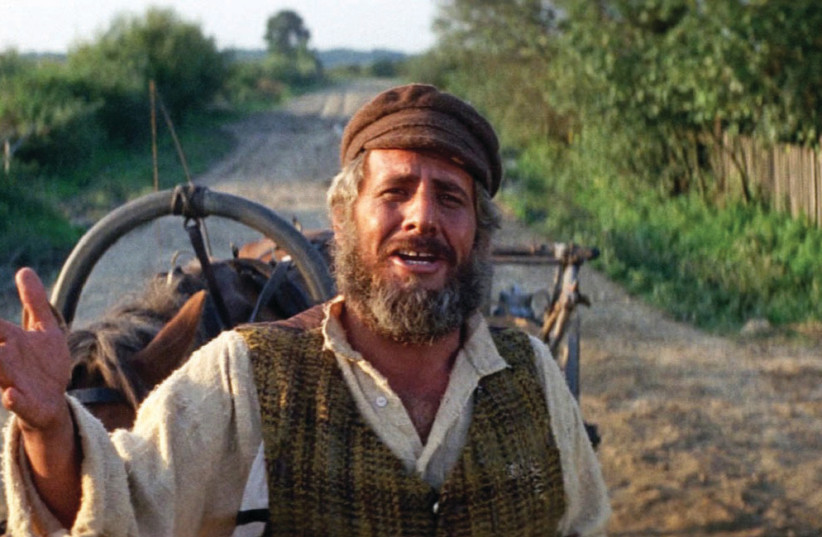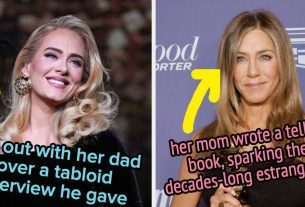Chaim Topol, who passed away in Israel on Wednesday, was a beloved, acclaimed Israeli actor, best known around the world for his portrayal of Tevye in the film adaptation of Fiddler on the Roof. He was 87.
Decades before Gal Gadot, Topol was the first Israeli to conquer Hollywood, receiving an Oscar nomination for Best Actor for Fiddler on the Roof in 1972 and winning a Golden Globe for the role. As David Brinn put it in a 2012 Jerusalem Post profile of the actor, “He was Israel’s most famous export since the Jaffa orange.”
He also won a Golden Globe in 1965 for Most Promising Newcomer – Male for the other role with which he would be most closely associated throughout his career, the title role in Ephraim Kishon’s comic masterpiece, Sallah Shabati.
Topol, who was usually known abroad only by his last name, was a gifted singer, as well as a talented actor. His legacy as a performer was sealed by these two roles, in which he played characters decades older than his real age – a rarity for an actor – and was utterly convincing in both.
Prime Minister Benjamin Netanyahu tweeted on Thursday: “My wife Sara and I, like all citizens of Israel, part sorrowfully today from our beloved Chaim Topol… one of Israel’s greatest artists. He had a great love for the Land of Israel, and the nation loved him back.”
רעייתי שרה ואני, ככל אזרחי ישראל, נפרדים היום בכאב עמוק מיקירנו חיים טופול – אהוב הקהל שהיה מגדולי אמניה של מדינת ישראל. הוא היה מגדולי אוהביה של ארץ ישראל, ועם ישראל החזיר לו אהבה
— Benjamin Netanyahu – בנימין נתניהו (@netanyahu) March 9, 2023
President Isaac Herzog wrote on Thursday: “Topol was one of the giants of Israeli culture, and he will be sorely missed.”
Opposition leader Yair Lapid tweeted on Thursday: “Chaim Topol, winner of the Israel Prize [was a] man of [great] spirit and culture. Tevye, the fiddler on the roof, and the legendary Sallah Shabati, who taught us the love of culture and of the land, has passed away. His character and his smile will continue to accompany Israeli culture, [and] his rich linguistic and musical heritage will forever remain one of the assets of Israeli [culture].”
חיים טופול, חתן פרס ישראל, איש רוח ותרבות. טוביה מכנר על הגג וסאלח שבתי האגדי, שלימד אותנו אהבת תרבות ואהבת הארץ, הלך לעולמו.דמותו וחיוכו ימשיכו ללוות את התרבות הישראלית, מורשתו עשירת השפה והמוזיקה תשאר לנצח חלק מנכסי הישראליות.שולח ניחומים לגליה ולכל המשפחה. יהי זכרו ברוך
— יאיר לפיד – Yair Lapid (@yairlapid) March 9, 2023
Topol, who received the Israel Prize in 2015, was born in 1935 and grew up in Tel Aviv. Even as a child, he was drawn to performing, recalling in the 2012 interview, “My teacher picked me out from the class to lead the ceremonies for all the holidays, like Lag Ba’omer and Tu Bishvat. I was already singing and acting, but I didn’t know it was something special; it’s just what all kids did. It happened again and again as I got older. The first day of high school, the teacher said to me, ‘OK, you’re going to play this part in our play.’”
After a stint working as a printer’s apprentice at the newspaper Davar, he served in the Nahal Entertainment Troupe of the IDF. During his military service, he began a partnership with the great comedic actor Uri Zohar. He also met his wife, Galia, in the army troupe, and they married in 1956. He often credited his success to the fact that she stepped back from her own career to raise their three children.
In the late 1950s and early ’60s, he performed in the Batzal Yarok (Green Onion), a satirical revue that was a precursor to today’s Eretz Nehederet, which included Zohar and Arik Einstein. In 1960, Topol co-founded the Haifa Municipal Theater with Yosef Milo and performed the classics, including works by Shakespeare and Brecht, and performed with the Cameri Theater in Tel Aviv.
In 1964, he was cast in the lead role in the movie adaptation of Kishon’s play Sallah Shabati, which he knew well because he had already performed in skits from it in the army.
He played Sallah, a Mizrahi patriarch who immigrates to Israel with his family and whose life Kishon used as a vehicle to satirize virtually every aspect of Israel society, from bureaucrats to kibbutzniks to representatives of Jewish organizations who used not-so-kosher tactics to coax donations out of gullible American Jews. While the script pokes fun at Sallah’s ignorance, Topol’s performance elevated it to much more than a satire.
When he cannot fulfill his promises to his family and give them a better life – after he tries and fails to get them out of the rundown, overcrowded transit camp where they have been assigned to live – and he rails at the God in whom he believes for letting him down, it isn’t funny; it’s heartbreaking. He played the drama in the story at a time when there were no barriers to poking fun at Mizrahi characters and helped give the movie the depth that has made it a classic.
Following that film, he caught the eye of international producers, and he was cast in his first international English-language feature, the 1966 American production of the Mickey Marcus biopic, Cast a Giant Shadow, in which Topol acted alongside Frank Sinatra, Kirk Douglas, John Wayne and Yul Brynner.
“The producers were looking for somewhat of an older man to play an Arab character, and they saw me in Sallah and said, ‘He’ll do,’” he told The Jerusalem Post in 2012.
Topol gets award-winning Tevye role
He first played Tevye the Dairyman in a 1966 production of Fiddler on the Roof, in which he replaced the lead actor, Shmuel Rodensky, who fell ill.
“Because of Sallah, I got called to London to audition for Fiddler – they were looking for the old guy from Tel Aviv,” Topol said. “So when my agent from the William Morris Agency announced to the producers that Mr. Topol is here, a whole battery of people turned my way and looked right through me for the old guy. I never had a problem playing someone older than I was. I was 27 when I did Sallah and 30 when I did Fiddler for the first time. I utilized techniques to prevent myself from making young gestures or moving too fast. I had to close [my] muscles and not use them to make sure I didn’t break the illusion for the audience.
“You need to force a discipline on your body to make sure you don’t break that wall. Obviously, it gets easier when you’re older, and you can do whatever you feel like. The last time I played Tevye was three years ago, when I was 74 and [I] had to adjust the opposite way, to play someone who’s 50 and has a young daughter. It’s no different.”
Following Fiddler on the Roof, he had a brief film career abroad. He played the title role in Joseph Losey’s 1975 film Galileo and starred opposite Mia Farrow in Sir Carol Reed’s The Public Eye in 1972. He appeared in Flash Gordon and the James Bond film For Your Eyes Only and appeared in the miniseries The Winds of War, War and Remembrance and Queenie, among others.
But Topol returned to Israel, acting on stage in many roles. He enjoyed being identified with Fiddler and reprised the role many times both in Israel and abroad. He last portrayed Tevye at a performance in London in 2009.
Topol’s activism and personal endeavors
He devoted much of his life to fighting for organizations he believed in. He helped establish the Jordan River Village in the Lower Galilee, a vacation camp for children with life-threatening illnesses, and modeled it on Paul Newman’s village for ailing children in the US, which the actor showed him. Topol counted this work as one of his proudest achievements.
He wrote an autobiography that was published in England. A gifted artist, he illustrated more than 20 books, and his drawings of Israeli presidents were reproduced on an Israeli commemorative stamp series.
Proud of his achievements both abroad and at home, he said, “I think there’s room for both singing in English and keeping that thread of Hebrew Israeli culture alive.”
Topol’s body will lie in state at the Cameri Theater in Tel Aviv on Friday morning, and his funeral will be in the afternoon.



